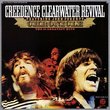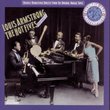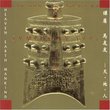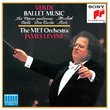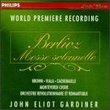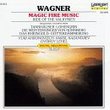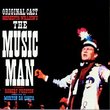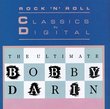| All Artists: Frederick Delius, Thomas Beecham, London Philharmonic Orchestra Title: Delius: Orchestra Works, Vol. 3 Members Wishing: 0 Total Copies: 0 Label: Naxos Original Release Date: 1/1/2028 Re-Release Date: 8/15/2000 Genre: Classical Styles: Opera & Classical Vocal, Historical Periods, Modern, 20th, & 21st Century, Romantic (c.1820-1910), Symphonies Number of Discs: 1 SwapaCD Credits: 1 UPC: 636943190623 |
Search - Frederick Delius, Thomas Beecham, London Philharmonic Orchestra :: Delius: Orchestra Works, Vol. 3
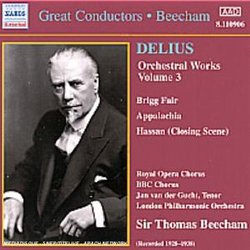 | Frederick Delius, Thomas Beecham, London Philharmonic Orchestra Delius: Orchestra Works, Vol. 3 Genre: Classical
|
Larger Image |
CD DetailsSimilarly Requested CDs |
CD ReviewsBench-Mark Performances. John Austin | Kangaroo Ground, Australia | 10/13/2000 (4 out of 5 stars) "Great value indeed! With this CD, Naxos completes its series of Delius works recorded in the 1920 and 1930s by Sir Thomas Beecham. Transfers from 78s have been judiciously managed by Devid Lennick, who supplies informative notes, as does Lyndon Jenkins, Chairman of the Delius Society. Production values in this 2000 issue are all that could be wished for, as are the affectionate and dedicated performances under Beecham's direction. "Appalacia" is the principal work here, recorded in 1938. The sound is marginally better than can be heard on the fist two CDs in this series. The original 78s apparently pleased the ever-fastidious Sir Thomas and his producer Walter Legge. What a pity they didn't transfer their operations to the Kingsway Hall! Conditions at the Abbey Road Studio sound cramped and airless. Nevertheless these are bench-mark performances." LAST AND NOT LEAST DAVID BRYSON | Glossop Derbyshire England | 01/22/2005 (5 out of 5 stars) "This is now the third - third of three it seems - of the new reissues of Beecham's early Delius recordings. It takes in the performances Beecham gave in 1938 plus one of Brigg Fair from 1928. Like its two forerunners this disc benefits from an informed and informative short commentary from Lyndon Jenkins, chairman of the Delius society, and like the second of the series it also has a short note from the producer, the skilful and adroit David Lennick, on some of the technical problems he had to circumvent. Obviously there is no way that even Mr Lennick could transform recorded sound from so long ago into the sort of quality we take for granted nowadays, but he has done a fine job all the same. The major difficulties were with the 1928 item (unsurprisingly) and matters improve noticeably with the move to the famous Abbey Road recording studio for the others. I'm not clear what Mr Lennick means when he talks about `a more cramped studio than previously'. The details on the back of the box read as if the same studio was used as in the second set of recordings, but I don't detect a lot of difference however that may be.
I can't bring myself to deny a fifth star to this modestly-priced disc. Beecham did later recordings of Delius in far better sound, and I would not dare suggest that the later performances were inferior in any way, but there is a special historical significance to these early products. In 1928 Eric Fenby, newly arrived as amanuensis to the ailing composer, overheard Delius reacting enthusiastically to a broadcast of Brigg Fair by Beecham. The sound-quality can't have been marvellous, so we also ought to be able to enjoy the piece as recorded here, a performance only weeks later than the performance that overjoyed Delius. Appalachia is here too, the very work that first fascinated Beecham with the music of Delius, and I can't believe that his first recording of it did not have special significance for him. So far as I know they are all first recordings, and that gives them special interest and significance for me too. All the works here are relatively well known, and the inclusion of La Calinda at least, and to a great extent Appalachia as well, should help dispel any understandable suspicions that all Delius's music has the tempo-marking `andante'. The choral sound is perfectly tolerable at worst, and at the end of Appalachia quite surprisingly good. The most important thing is that his special orchestral wizardry should get a chance to make itself heard through his greatest and most dedicated interpreter, and I move a hearty vote of thanks to Mr Lennick and to Naxos. Delius is not quite like anyone else, indeed not much at all like anyone else. Who I should be recommending this record, and its two predecessors, to I'm not quite sure, but one answer would be `everyone'. Allowances obviously have to be made for the antiquated sound, but to me that is simply no problem. For the unconvinced, the best thing to do would be to hear it before deciding on a possible purchase. For the special devotees of Delius, or of Beecham, or of both, I imagine there is likely to be no doubt or hesitation about it." |

 Track Listings (5) - Disc #1
Track Listings (5) - Disc #1